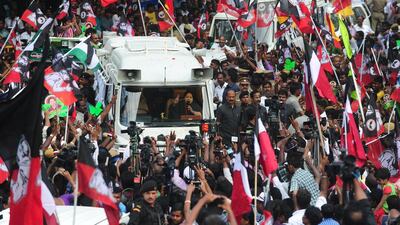NEW DELHI // Pazhani had just opened his small tobacconist kiosk in south Chennai last Tuesday when two men arrived, bought cigarettes, and offered him money to vote for the ruling party in the state election.
Later that day another man made a similar offer: money up front, but to vote for the opposition instead.
“It happens all the time,” said Pazhani, who asked to be identified only by his first name. “Even in previous elections in Tamil Nadu, I’ve been approached like this. It’s a matter of routine now.”
Pazhani said he took the money – between 1,000 rupees (Dh55) and 2,000 rupees from each party. But he insisted it would not change the way he voted. “So in that case, what’s the harm? It’s only the parties that get hurt.”
As Tamil Nadu gears up to elect a new state government on Monday, allegations have mounted that both the ruling All India Anna Dravida Munnetra Kazhagam (AIADMK) party as well as the opposition Dravida Munnetra Kazhagam (DMK) party have given out large amounts of money to buy votes.
Neither party has responded to such claims, or to criticism that cash handouts have become a part of the electoral culture in the state.
As in every national and state election in India, the election commission has formed “flying squads” to conduct raids on people with party links who are suspected of carrying inordinate amounts of cash.
Officials have seized 1.61 billion rupees in cash so far in the five states electing new governments – Kerala, West Bengal, Puducherry, Assam and Tamil Nadu. The bulk of this – nearly 1 billion rupees – was seized in Tamil Nadu, although the election commission clarified that about 450 million rupees was returned after verification of documents of provenance.
Officials did not specify how much of this money was traced back to individual parties.
The crackdown on such malpractice began in mid-April in Tamil Nadu, with the first major raid discovering 60 million rupees in the house of a man with close links to an AIADMK minister.
The election commission also set up a dedicated phone number with a WhatsApp account to register complaints about cash distribution. The flying squads and tax officials worked together to act on these complaints within hours.
Even so, stories such as Pazhani’s continue to circulate. On average, “people are talking about 1,500 rupees for each postal vote, and a similar amount for a regular vote”, said Badri Seshadri, a Chennai-based political analyst. “I think the magnitude of cash for votes in Tamil Nadu is way over anything that is happening elsewhere.”
Parties collect money through channels of corruption, such as bribes for political favours, to create stashes of ready cash running into billions of rupees. In election season, this money is given to candidates for their campaigns but also to middlemen to hand out to voters.
The practice is commonplace, Mr Seshadri said. “In the villages, almost everyone expects that money will be given to them, even if they decide who to vote for based on other criteria.”
But there is a paradox at the heart of this corruption: because voting is secret, parties can never know what their cash payments buy them. "It's very hard for politicians to enforce a quid pro quo," said Milan Vaishnav, a senior associate in the South Asia programme at the Carnegie Endowment for International Peace in Washington DC and the author of When Crime Pays, an upcoming book on criminality and politics.
Rather, “something more subtle” is going on, Mr Vaishnav said.
When candidates distribute cash, they signal to voters that they are viable players with real influence. But they also make these payouts out of fear that this is what their opponents are doing and that they will lose votes if they do not.
“So the only rational thing to do is to give money,” Mr Vaishnav said. “It becomes an arms race ... The money allows you to stay at the table and play, but it doesn’t guarantee victory.”
It is difficult to track how such payments affect the election results. Possibly if, like Pazhani, most citizens vote the way they intended to anyway, the outcome remains similar.
A study conducted during the 2009 parliamentary election by Sarthak Bagchi, a scholar at Leiden University, found that 70 per cent of respondents voted as they wished even after accepting gifts or cash from politicians.
But money still distorts the political system in other ways. Increasingly, Mr Vaishnav said, “unless you are personally wealthy or have ready access to significant sums of cash, it is nearly impossible to get a party ticket from a major political party”.
This is why a growing number of celebrities, industrialists, political dynasts and alleged criminals enter politics, he added.
However many raids the election commission conducts, it will still be “powerless” in controlling the distribution of cash, Mr Seshadri said.
Instead, the state has to crack down on corruption, which will constrict the flow of cash to politicians and parties. Once that happens, “the politician will not spend his personal money for cash-for-votes”.
“But this is easier said than done,” Mr Seshadri said. “It’s going to take a multi-pronged attack over decades to cut this problem down.”
ssubramanian@thenational.ae

